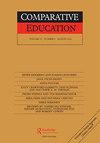探索政策转移中的后殖民关系:加纳以学习者为中心的教学法的案例
IF 3.7
1区 教育学
Q1 EDUCATION & EDUCATIONAL RESEARCH
引用次数: 0
摘要
摘要本研究以霍米·巴巴的混合概念和第三表述空间为框架,探讨了加纳通过以学习者为中心的教学法(LCP)的政策借鉴过程可能制定的后殖民关系。采访了9名加纳人和9名外国利益相关者。意识到传统援助中隐含的权力不平衡,本案例项目试图通过将政策领导权和责任分配给加纳利益相关者来挑战不对称的权力关系。然而,在项目中创造的第三个表达空间似乎并没有导致教学理念的混合:虽然是加纳人自己在项目中促进了LCP,但改革的概念基础依赖于他们在西方获得的知识和经验。本文的结论是,虽然在学校和课堂层面实施LCP的过程中可能会发生混合,但没有观察到土著和西方教学法混合的后殖民转向。摘要本研究以霍米·巴巴的“混杂性”和“第三发声空间“概念为框架,探讨加纳以学习者为中心教学法旨在透视一个国内外都十分关注(教育学)的政策借鉴过程中可能形成的后殖民关系。九名加纳本国和九名外国利益相关者接受了访谈。意识到传统援助中隐含的权力失衡,该案例项目通过将政策领导权和责任分配给加纳利益相关方,试图挑战不对称的权力关系。然而,该项目中创造的第三发声空间似乎并没有导致教学思想的混杂化:尽管是加纳人自己在该项目中推广以学习者为中心教学法,但改革的概念基础依赖于他们在西方获得的知识和经验。本文的结论是,尽管在学校和课堂层面实践以学习者为中心教学法的过程中可能出现混杂性,但未能观察到通过本土和西方教学法混杂化而实现的后殖民转向。我们感谢他们的时间和参与。非常感谢参与的受访者、评论者和Barbara Spronk对本文早期版本的反馈。披露声明作者未报告潜在的利益冲突。本研究得到了JSPS KAKENHI(资助号22K13651)和广岛大学女性研究人员联合研究基金的支持。作者简介:Sakata nozomi Sakata,日本广岛大学国际教育合作研究中心助理教授。在比较和国际教育领域,她的研究兴趣包括教育政策的传播和实施,重点关注中低收入国家的教学改革。Chris Yates,英国伦敦大学学院(UCL)教育学院(IoE)国际教育讲师。他在伦敦大学学院-爱学院教授国际硕士研究生课程。他对教育规划、体制变革和改革特别感兴趣。他曾在20多个低收入和中等收入国家的一些国际发展机构工作。Hannah Edjah是加纳海岸角大学职业技术教育系的讲师。主要研究方向为课程、教学、高等教育和家政教育。她目前正致力于设计教学策略,使那些没有互联网连接或互联网连接差的地区的学习者能够在危机期间继续学习。habraham Kwadwo Okrah是加纳大学勒贡教师教育系高级讲师。他的研究兴趣包括课程设计和实施的批判性分析及其与工作世界背景现实的相关性。本文章由计算机程序翻译,如有差异,请以英文原文为准。
Exploring postcolonial relationships within policy transfer: the case of learner-centred pedagogy in Ghana
ABSTRACTFramed by Homi Bhabha’s concepts of hybridity and the third space of enunciation, this study explores postcolonial relationships conceivably enacted through policy borrowing processes of learner-centred pedagogy (LCP) in Ghana. Nine Ghanaian and nine foreign stakeholders were interviewed. Conscious of the power imbalance implicit in traditional aid, the case project attempted to challenge the asymmetrical power relationships by allocating policy leadership and responsibility to Ghanaian stakeholders. However, the third space of enunciation created within the project did not seem to lead to a hybridisation of pedagogical ideas: while it was the Ghanaians themselves who promoted LCP within the project, the conceptual basis of the reform was dependent on knowledge and experiences which they gained in the West. This article concludes that the postcolonial turn through hybridisation of indigenous and Western pedagogies was not observed, although hybridity may happen in the process of actualising LCP at school and classroom levels.摘要本研究以霍米·巴巴的“混杂性”和“第三发声空间”概念为框架,探讨加纳以学习者为中心教学法(learner-centred pedagogy)的政策借鉴过程中可能形成的后殖民关系。九名加纳本国和九名外国利益相关者接受了访谈。意识到传统援助中隐含的权力失衡,该案例项目通过将政策领导权和责任分配给加纳利益相关方,试图挑战不对称的权力关系。然而,该项目中创造的第三发声空间似乎并没有导致教学思想的混杂化:尽管是加纳人自己在该项目中推广以学习者为中心教学法,但改革的概念基础依赖于他们在西方获得的知识和经验。本文的结论是,尽管在学校和课堂层面实践以学习者为中心教学法的过程中可能出现混杂性,但未能观察到通过本土和西方教学法混杂化而实现的后殖民转向。KEYWORDS: Postcolonial theorylearner-centred pedagogyHomi BhabhaGhanateacher education reformpedagogical reform关键词: :后殖民理论;以学习者为中心教学法;霍米·巴巴;加纳;教师教育改革;教学法改革 AcknowledgementsThis article has derived from collaborative analysis and numerous discussions with Eugene Adu Henaku, Mao Yamaguchi, Catherine Fox, Caroline Pontefract and James Sankale. We thank them for their time and engagement. Many thanks to the participating interviewees, reviewers and Barbara Spronk for their feedback on an earlier version of this article.Disclosure statementNo potential conflict of interest was reported by the author(s).Additional informationFundingThis work was supported by the JSPS KAKENHI (Grant Number 22K13651) and Hiroshima University’s Female Researchers Joint Research Grant.Notes on contributorsNozomi SakataNozomi Sakata is Assistant Professor in the Center for the Study of International Cooperation in Education at Hiroshima University, Japan. In the field of Comparative and International Education, her research interests include educational policy diffusion and implementation with a focus on pedagogical reform in low- and middle-income countries.Chris YatesChris Yates is a Lecturer in International Education at University College London (UCL), Institute of Education (IoE), England. He teaches on the international MA postgraduate programmes offered at the UCL-IoE. He is particularly interested in education planning, system change and reform. He has worked for a number of international development agencies, in over 20 low- and middle-income countries.Hannah EdjahHannah Edjah is Lecturer in the Department of Vocational and Technical Education at the University of Cape Coast, Ghana. Her research interest lies in issues pertaining to curriculum, teaching, higher education and home economics education. She is currently working to design teaching strategies that may empower learners in areas of no or poor internet connectivity to continue learning during crises.Abraham Kwadwo OkrahAbraham Kwadwo Okrah is a Senior Lecturer in the Department of Teacher Education, University of Ghana, Legon. His research interests include critical analysis of curriculum design and implementation and its relevance in relation to contextual realities of the world of work.
求助全文
通过发布文献求助,成功后即可免费获取论文全文。
去求助
来源期刊

Comparative Education
EDUCATION & EDUCATIONAL RESEARCH-
CiteScore
7.40
自引率
21.20%
发文量
35
期刊介绍:
This international journal of educational studies presents up-to-date information with analyses of significant problems and trends throughout the world. Comparative Education engages with challenging theoretical and methodological issues - and also considers the implications of comparative studies for the formation and implementation of policies - not only in education but in social, national and international development. Thus it welcomes contributions from associated disciplines in the fields of government, management, sociology - and indeed technology and communications - as these affect educational research and policy decisions.
 求助内容:
求助内容: 应助结果提醒方式:
应助结果提醒方式:


